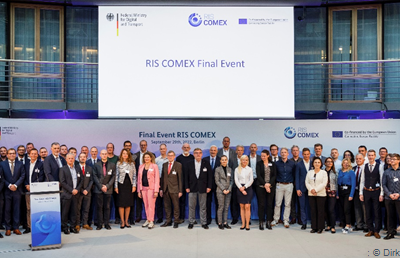RIS and eFTI – building blocks for digitalisation of inland shipping
15 June 2023
Inland waterway authorities see electronic Freight Transport Information (eFTI) as an important opportunity to take inland shipping to the next level in terms of digitalisation. eFTI is also an enabler to make multimodal transport more efficient for logistics operators. The eFTI Regulation sets the legal basis for paperless transport which is a precondition for end-to-end digital supply chains where real-time data can be shared between trusted logistics parties and with mandated competent authorities.
As the eFTI Regulation will be fully applicable as of end 2025, a number of waterway authorities have started to undertake the necessary actions for implementation. To comply with the need of data requirements, these inland waterway authorities are developing an IWT specific data model and process that will be able to support complex multimodal logistics chains in compliance with the eFTI Regulation for sharing data with authorities.
The complementarity between River Information Services (RIS) and eFTI is a condition sine qua non. An in-depth assessment is underway to understand how current RIS requirements concerning electronic reporting can comply with the eFTI Regulation and how existing solutions like EuRIS, CEERIS, Hermes (BICS, Riverguide), eRIBa, VELI/CEDRE and potential others can be structured as building blocks of a European interoperable eFTI environment.
Some INE members have started to simulate and test the eFTI architectural choices – as proposed by the Commission – in day-to-day use cases with Economic Operators. The aim is to enable a common understanding between all stakeholders on how the eFTI Regulation can be practically implemented for inland navigation. The tests also aim at facilitating the buy-in of the Economic Operators to ensure a positive return on investment of the public costs to set up the eFTI Gates. The results will be shared.
We call upon the Commission:
- To guarantee flexible and autonomous access rights for relevant regional and functional mandated authorities;
- To require and enforce the sharing of cargo related RIS information via the eFTI architecture to ensure reporting-only-once;
- To ensure that any change, especially related to ES-RIS, that may result from the work ensuring complementarity between RIS and eFTI, is taken account of in the CESNI work programmes;
- To help keep the inevitable period of dual use of paper next to a complete digital working process as short as possible.
Together, we look forward to ensuring an efficient and effective complementarity between RIS and eFTI, taking into account the existence of national systems and EuRIS for the benefit of the integration of inland waterway transport in digital supply chains.



